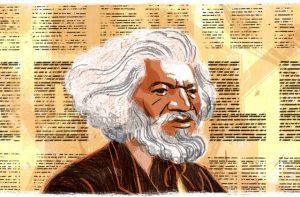I would unite with anybody to do right and with nobody to do wrong.
– Frederick Douglass

On Monday, Google kicked off Black History Month with a doodle of Frederick Douglass (pictured above) and a corresponding link to web results on the famous abolitionist. Born into slavery in 1818, Douglass rose to prominence as one of the most influential figures of the Civil War era, and was once nominated as the first African American vice-presidential candidate on Victoria Woodhull’s ticket (Woodhull was also the first female presidential candidate).
Origins of Black History Month
Black History Month as we know it today first took place in February 1970. Its precursor was Negro History Week, started in 1926 by historian Carter Woodson, who sought to encourage the teaching of African American history in the public schools. Woodson selected the time of year to coincide with the birthdays of Abraham Lincoln and Frederick Douglass, both of whom were born in February and figure prominently in African American history.
Criticism
The origins of Black History Month go back 46 years this month, but despite its good intentions, the commemoration has had its share of criticism. The journalist and lawyer Afua Hirsch, writing in the Guardian in 2010, argues that Black History Month should be more than “hero worship,” that important historical figures (Douglass, for example) should not be made into “simplistic figures of black pride.” The larger issue, Hirsch writes, is that mainstream history so rarely makes a true accounting, although without Black History Month, she concedes, there might be no accounting whatsoever.
Frederick Douglass: More than a ‘Hero’
To that end, let’s take a look at Frederick Douglass’s life and record of accomplishment:
- Born into slavery in 1818
- Largely taught himself how to read and write
- After two failed attempts, ultimately escaped from slavery in 1838
- Married and settled in Massachusetts, where he became an abolitionist and preacher
- In 1845, published his first autobiography, “Narrative of the Life of Frederick Douglass, an American Slave,” a best-seller of the time
- Published (among others) the abolitionist newspaper The North Star
- In addition to the abolition of slavery, advocated for the women’s right to vote
- Nominated for Vice President in 1872 and served as a statesman for the U.S. government in various capacities
- Died in 1895 in Washington, D.C., having fought for equal rights his entire life
This shows why all Americans should do more than take simplistic pride in Douglass, to think of him as a “hero,” only to forget until next February’s Black History Month. Frederick Douglass, like many others, serves as a historical reminder that justice is a hard-fought ideal, worth fighting for all year long.

